Entering into the toddler years presents a whole new set of parenting challenges, especially when your toddler doesn’t listen. Many days when I wonder if I’ll ever learn how to make kids listen. I enjoy a good challenge. So there’s that.
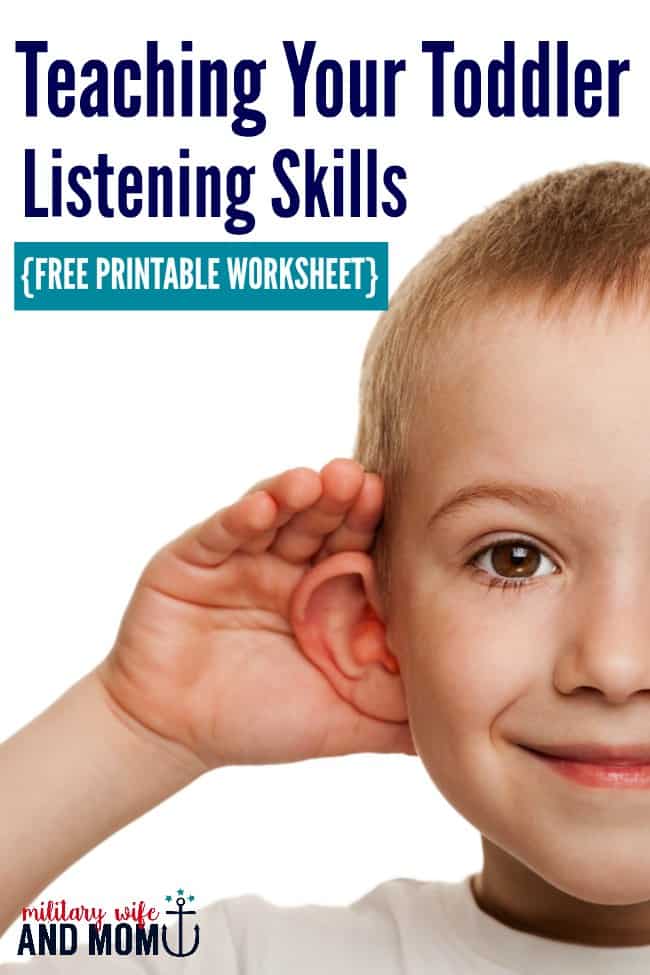
Our listening journey started the moment my son started to run around the house checking to see if off limit items were still–in fact–off limits.
He would run away in the parking lot, pull at electrical chords, throw food on the floor and when I corrected him, he would laugh and make silly faces at me.
I wasn’t laughing.
10 strategies when your toddler doesn’t listen.
Let’s check out ten strategies you can use when your toddler doesn’t listen to make your days a little less frustrating. For me, these listening strategies are worth it.
If I experience a fewer frustrating moments each day or avoid one power struggle, it can keep me from turning into an angry mom volcano, and let’s be honest, that benefits everyone.
1. Call your child by name.
Using nicknames and terms of endearment is commonplace when interacting with small kids. I call my son all sorts of crazy stuff, but when it comes to listening, I’ve found using the good old fashioned birth name is really the most effective.
Using your child’s real name helps get his attention specifically, and it let’s them know you are about to share important information.
2. Get down to the child’s level.
This is something I learned working full-time as a nurse. We were taught to get down to the patient’s eye level to help them know we cared. If a patient was lying in bed, I would squat down or sit in the chair to look the patient in the eye as we talked.
This technique applies perfectly to any age or ability. When your toddler doesn’t listen, squat down or sit on the ground before communicating. Plus, when you are at the same level, you can hear and see each other better, both of which improve listening.
3. Make eye contact.
This is an overwhelmingly popular parenting tip because it is very effective when toddlers don’t listen. In a variety of situations, eye contact is huge! After getting down to your child’s level, say his or her name again and wait until your eyes meet. At that very moment you’ll know he or she is paying attention and focusing on what you are saying.
4. Use gestures and expressions.
Toddlers understand a reasonable amount of language, but using gestures and facial expressions can better clarify your message and improve understanding. Your child will better understand what you are saying, if you furrow your brow or shake your head than if you list instructions. Similarly, you can also try to use happy expressions and nodding if you want to reinforce something your toddler is doing well.
5. Keep realistic expectations.
Recognize age appropriate expectations for your child. Most toddlers will obey only some of the time. It isn’t realistic to expect toddlers to listen to every instruction.
Related: How Much Should Your Toddler Listen?
6. Keep instructions short.
The shorter and more succinct your message, the more likely your toddler with understand you and listen. Toddlers are easily overwhelmed with long instructions and stop listening. Using one or two very short sentences, aim to keep it simple.
We also love using these printable routine cards at bedtime, mealtime and in the morning and they help A TON with cooperation!
7. Use praise effectively.
Using the right type of praise is so important when toddlers don’t listen. Using the words “good job” or “you’ve won” offers momentary praise, but it doesn’t share what the child did well, and in the long run creates narcissistic and entitled kids.
Instead, describe specifically what your child did well in each situation without using “good job.” An example would be, “You found a way to put all the toys away quickly.” Or “You carried your sink to the plate. That was helpful.” Or “You played gently with your sister.”
Recognizing your child’s individual strengths will help him or her to start doing more of what you like and less of what you don’t.
Related: The Problem With Over-Praise and What To Do Instead
8. Use validation to gain cooperation.
When kids feel heard and understood, they are far more likely to want to cooperate with you! This is often referred to as sportscasting with your child. Repeat back what the child is saying or doing. Even if you don’t agree with what the child wants, repeat the child’s upset back to them. “You want….[insert what the child wants].” This doesn’t mean you will give in to what the child wants. It simply means you understand the child’s communication, and in doing so, you’re building a bridge to cooperation.
9. Try the whisper technique.
When all else fails, I start whispering and get very quiet. When I am at my son’s level, and I am looking him in the eye, and I know he is ready to listen, I start to whisper. It’s almost as if I am telling him a secret. He starts to listen very carefully and often starts smiling. I also love using this technique when he is screaming around the house or I feel compelled to yell at him. It’s fun to do the opposite and whisper.
You could also try this crazy and weird noise tip that I learned from Language of Listening.
10. Sing your words.
Music is a powerful tool to use when your toddler doesn’t listen. It can improve a child’s mood, catch their attention, and improve listening. In addition to whispering, you could also try singing to make the words more fun and enjoyable. Children often feel like following a set of instructions that are sung to them is an exciting game or activity.
We love these following direction and listening games in our home to help our kids “practice” during play.
When your toddler doesn’t listen.
Listening is a struggle no matter the age of your child. These 10 strategies are the building blocks to help grow and nurture your child’s listening skills.
Will all of these tips make your toddler listen ALL the time?
Probably not.
However, they will help when your toddler doesn’t listen at least SOME of the time. My son is now a preschooler and his listening is getting better each day. From staying close to me in the parking lot, to making smart meal-time choices, to going to bed on time, I promise you, these techniques work if stay consistent.
Print this free toddler listening checklist.
This post comes with a free printable checklist to help with toddler listening. I always have the hardest time remembering these phrases. This printable simplifies it!
Here is a sneak preview…
Download Your Free Printable
- Download the checklist. You’ll get the printable, plus join 37,000+ parents who receive my weekly parenting tips and ideas!
- Print. Any paper will do the trick, but card stock
would be ideal.
- Place it on your refrigerator. Check things off as you go and don’t forget a thing!
Want more on toddlers?
- What No One Tells You About Parenting Toddler Boys
- 9 Phrases That Change Life with a Toddler
- Dear Moms of Wild Toddlers
- The Real Reason Why Kids Won’t Listen, Focus or Sit Still
- 7 Core Following Directions Activities That’ll Improve Listening
I've created a free email series just for you! If you are struggling with teaching your child to listen, this series will help transform your parenting. Yes, really. I've seen my proven strategies work time and time again for parents. I know it can work for you too.
After taking my free email series, you will:
- Learn simple, yet highly effective listening strategies
- Experience a stronger connection with your child
- Enjoy more peaceful parenting days
- Gain more cooperation from your child

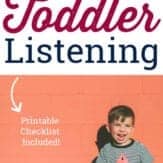
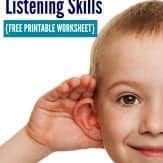
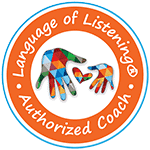
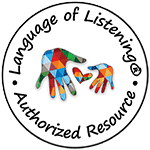
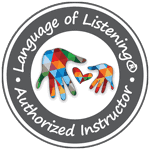
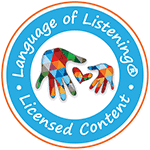








Great tips. Although, I don’t think my toddler is physically capable of carrying ‘his sink to the plate’. 😉
Depends on the toddler and how far the sink is and how heavy the plate is 🙂 This is definitely not a requirement, simply a suggestion.
hi Lauren… I think the statement made “You carried your sink to the plate”, suppose to be the other way around. Correct us if we misunderstood thanks.
Hi Lauren
Thanks for this helpful article 🙂
I just wanted to let you know that in the paragraph about effective praise you wrote “carry your sink to the plate” instead of plate to the sink. 🙂
I have read this article a few times over the last couple of months and only just picked it up now.
Have a great week. Xx
Great tips! We have a 2 1/2 year old grandson in our household. I feel these tips will be very helpful especially if we all get on board! Thank you!
We all make little word switches sometimes but this was one of the funniest. Talking about a toddler say instead of good job say “you’ve carried your sink to the plate.” I think your child is superman! Just sayin. Lol love it.
My 3 year-old daughter has always had, and still has tantrum episodes every single day. It’s humiliating. Bedtime is so stressful EVERY DAY! And this is not the only time she is out of control. I have tried it all; routine, stories, positive reinforcement, games, etc., still, nothing works. We can’t figure it out…we would appreciate your input… I’m all ears!!! Thanks!!!
My baby is already 6 years old, but I can remember tantrum horror like it was yesterday. I had some advice from my mother; my favorite was time-outs… sparingly. Depending on the child, using a time-out occasionally, beginning at about the age of 18 months especially intense and other techniques aren’t working. Placing your child in a quiet, or –better yet– boring spot for a brief period (about one minute per year of his age) can be a good lesson in self-soothing. Also there are lessons online on how to talk with your toddler correctly. Most of them are rubbish, but few are gold. I found this one https://bit.ly/2F3SvFk helpful.
This is such a great list, however whenever I employ the singing technique my toddler says something like “you’re stwessing me out mom!” Haha!
Need to try the whisper one more often.
These worked fantastically on my eldest but my 3 year old twins literally nothing works. Or it does once and never again. Its a constant battle. But apparently they’re not on the spectrum so I guess that’s something. Its been a long two years
Hahaha! I have tried all of these except the whispering. I look my child in the eyes or tell her to look at me and she avoids eye contact at all costs. I say her name and she still won’t look at me. It is completely and utterly frustrating.
My 18 month old daughter sings all nursery rhymes she has heard but tells me “no” when I teach her to use the potty